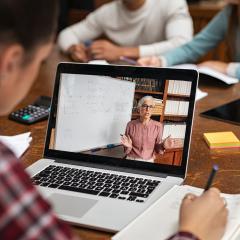Supporting Online Learning in a Time of Pandemic

The COVID-19 pandemic has pushed almost all school systems in the U.S. online with little or no preparation. You might see teaching in the current climate referred to as "online learning" but, in many cases, "emergency instructional triage" would be more fitting.
This crisis has forced a dramatic transformation in classroom instruction. While online programs at the USC Rossier School of Education have been developed over the course of years—we first launched our groundbreaking online MAT program in 2009—schools do not have that luxury. We have combined our knowledge of best practices for online instruction with our knowledge around how best to prepare teachers to publish a new report with immediately useful resources and concrete advice. The pandemic brings new problems each day, and we want to help inform educators and leaders in need.
Aimed at all teachers and teacher candidates; principals and district leaders; counselors and special needs educators; and administrators and teacher-education programs, the report answers the following six questions with key recommendations for each:
What are key lessons for engaging students in online instruction? What strategies might lead to the most success in keeping students engaged?
How do we teach students who don't have reliable internet access? Is there something better than a work packet? What eases the burden on parents?
How might districts, schools and teachers re-consider grading practices? What are alternatives to traditional grading and how do they work?
How should schools and teachers address learning for students with special needs? How can we ensure that individualized education plans (IEPs) are being met effectively?
Let's say that online instruction is a necessity after this school year. How should districts and teacher-prep programs better prepare for teaching online?
Answers to these questions include in-depth discussions of how to engage high school seniors at this key moment in their educational careers and of how to give good feedback in an efficient way via remote instruction. The report concludes with three appendices offering (a) further reading and resources; (b) strategies for instruction in Zoom; and (c) information on how to create a secure online classroom.
This new resource seeks to address many of the major concerns of K–12 teachers and administrators. Bringing together the expertise of faculty who have decades of experience teaching in virtual learning environments, as well as deep knowledge of teacher education pedagogy and educational psychology, this report provides practical recommendations that can serve as a practical guide during this difficult and complex time. It’s up to all of us to do our parts to make learning accessible and engaging, and the USC Rossier faculty is doing what it can to support educators in the new task of educating students remotely.
The report, Supporting Online Learning in a Time of Pandemic, can be found at regenhealthsolutions.info/wp-content/uploads/2020/04/report-supporting-online-learning-during-pandemic.pdf
Gallagher, K. S. (2020, April 13). Supporting online learning in a time of pandemic [Commentary]. Policy Analysis for California Education. https://edpolicyinca.org/newsroom/supporting-online-learning-time-pandemic



